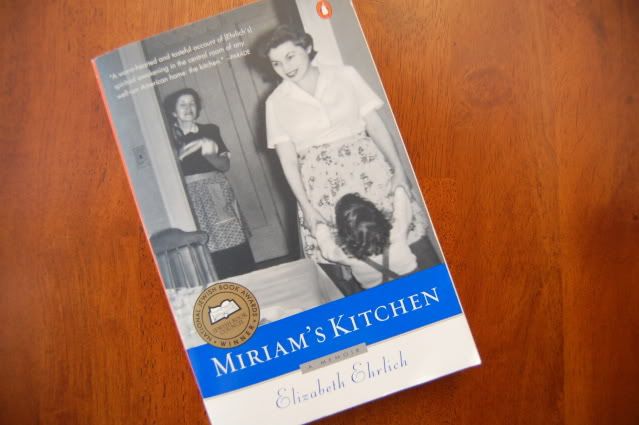-
week four | book of the week | miriam's kitchen
-
week four | book of the week | miriam's kitchen
-
My sister somehow had two copies of Miriam's Kitchen by Elizabeth Erlich, so she kindly gave one to me. This memoir, about a woman returning to the Jewish traditions of her ancestors, had been sitting atop my bookshelf for some months. It wasn't a book I had chosen or that I was particularly drawn to, but it was sitting there waiting to be read, so I picked it up at the end of January.
-
If anything drew me to it, though, it was the following quote from the introduction that my sister had e-mailed me some weeks before, when she began reading it herself: "Yet serious cooking is an essentially optimistic art. It reaches into the future, vanishes into memory, and creates the desire for another meal." This enchanting view of cooking is embedded into the very core of the memoir. And the traditional kosher kitchen of Erlich's mother-in-law becomes the central setting.
-
Throughout the memoir, Erlich recounts small snapshots of her life as a young girl growing up in a partially-committed Jewish family, one that was slowly falling away from the traditions of the faith. As she grew older and left home, she separated herself almost entirely from her family's faith. It was not until she married and met her mother-in-law, Miriam, that she slowly began to return to Judaism, to the traditions of her past, to her family's history, and to the kosher kitchen.
-
The memoir is organized by the months of the year, beginning in September and going through each month with small essay-type chapters on varying topics and interspersed with her family recipes. However, the memoir is not chronological whatsoever; Erlich will jump from one essay-chapter about her life as a child to another essay-chapter about her grandmother's childhood. But it was all done seamlessly and the hopping from one time period to another blended easily into the story of how Erlich became increasingly attracted to the values and traditions of Judaism.
-
Ultimately, though, it was Miriam in her kitchen that drew Erlich back. She writes, "It has always been the religion of the home that compelled me, not that of the public sphere. My felt heritage was kitchen, and holiday, and attitude, the atmosphere that my grandmothers were able to protect and transmit, against odds, through time." Above all, Erlich clearly treasures the small moments and traditions of life most. "I am struck, as always, by the small things," she writes.
-
As unfamiliar as I am with the daily rituals and life of a Jewish family, this proved to be a helpful introduction. And while perhaps it wasn't the most compelling read, it certainly aroused in me a greater admiration for the small things of life, for traditions and heritage, and for the the ever-optimistic art of cooking.
-
Book Information:
Published in 1997 by Penguin
361 pages
13 chapters:
---1. September - Longing
---2. October - Diaspora
---3. November - Native Ground
---4. December - Inheritance
---5. January - Obligation
---6. February - Observance
---7. March - Miracles
---8. April - Female Religion
---9. May - Decisions
---10. June - The Life Force
---11. July - Community
---12. August - Words and Deeds
---13. September - Continuity
Introduction
Price: $10.88
-
-
If anything drew me to it, though, it was the following quote from the introduction that my sister had e-mailed me some weeks before, when she began reading it herself: "Yet serious cooking is an essentially optimistic art. It reaches into the future, vanishes into memory, and creates the desire for another meal." This enchanting view of cooking is embedded into the very core of the memoir. And the traditional kosher kitchen of Erlich's mother-in-law becomes the central setting.
-
Throughout the memoir, Erlich recounts small snapshots of her life as a young girl growing up in a partially-committed Jewish family, one that was slowly falling away from the traditions of the faith. As she grew older and left home, she separated herself almost entirely from her family's faith. It was not until she married and met her mother-in-law, Miriam, that she slowly began to return to Judaism, to the traditions of her past, to her family's history, and to the kosher kitchen.
-
The memoir is organized by the months of the year, beginning in September and going through each month with small essay-type chapters on varying topics and interspersed with her family recipes. However, the memoir is not chronological whatsoever; Erlich will jump from one essay-chapter about her life as a child to another essay-chapter about her grandmother's childhood. But it was all done seamlessly and the hopping from one time period to another blended easily into the story of how Erlich became increasingly attracted to the values and traditions of Judaism.
-
Ultimately, though, it was Miriam in her kitchen that drew Erlich back. She writes, "It has always been the religion of the home that compelled me, not that of the public sphere. My felt heritage was kitchen, and holiday, and attitude, the atmosphere that my grandmothers were able to protect and transmit, against odds, through time." Above all, Erlich clearly treasures the small moments and traditions of life most. "I am struck, as always, by the small things," she writes.
-
As unfamiliar as I am with the daily rituals and life of a Jewish family, this proved to be a helpful introduction. And while perhaps it wasn't the most compelling read, it certainly aroused in me a greater admiration for the small things of life, for traditions and heritage, and for the the ever-optimistic art of cooking.
-
Book Information:
Published in 1997 by Penguin
361 pages
13 chapters:
---1. September - Longing
---2. October - Diaspora
---3. November - Native Ground
---4. December - Inheritance
---5. January - Obligation
---6. February - Observance
---7. March - Miracles
---8. April - Female Religion
---9. May - Decisions
---10. June - The Life Force
---11. July - Community
---12. August - Words and Deeds
---13. September - Continuity
Introduction
Price: $10.88
-



No comments:
Post a Comment